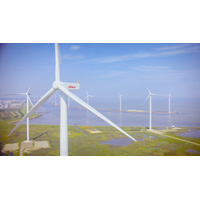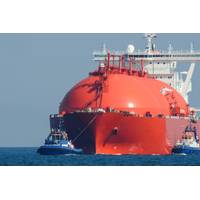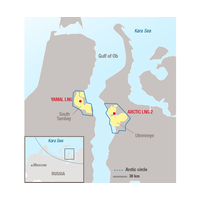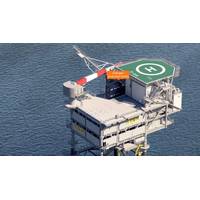Asian countries are looking to purchase more US energy in order to balance trade imbalance

As they try to reduce their trade surpluses with Washington, Asian governments are buying more U.S. gas and oil in order to ease their tariff burdens due to President Donald Trump’s new import duties. Many Asian countries have large trade surpluses and also are major energy importers. Trump's tariffs have caused economic and market turmoil. Here are some measures Asian countries will take to increase their purchases of U.S. gas and oil.
Asian countries are looking to purchase more US energy in order to balance trade imbalance

As they try to reduce their trade surpluses with Washington, Asian governments are buying more U.S. gas and oil in order to ease their tariff burdens due to President Donald Trump’s new import duties. Many Asian countries have large trade surpluses and also are major energy importers. Trump's tariffs have shook markets and economies. Here are some measures Asian countries will take to increase their purchases of U.S. gas and oil.
Mitsubishi to invest $27 billion in the next three years to drive growth
Mitsubishi Corp, a Japanese trading company, said it would invest 4 trillion yen (about 27 billion dollars) in the next three financial years to boost growth. It also aims to increase its net profit from 1.2 trillion to 1.2 trillion by 2027/28. Mitsubishi announced its new management strategy for the next three years, starting this month. It also stated that it would continue its basic policy, which includes progressive dividends and flexible buybacks of shares…
Japan adopts new policies on energy, climate and industry through 2040

The Japanese government approved new targets on Tuesday to reduce the country's emissions of greenhouse gases through 2040. It also approved a revised energy policy and updated industrial policies for the same time period. The measures are aimed at enhancing long-term stability of policy for businesses. They focus on decarbonisation and ensuring stable energy supplies, as well as strengthening industrial capacities to drive economic growth.
Mitsubishi charges $342 Million for Japan Offshore Wind Projects

Mitsubishi Corp., a Japanese company, announced on Thursday that it had taken an impairment charge of 52.2 billion yen (US$342.4 million) on its domestic offshore projects for the nine months ended in December. Mitsubishi led consortiums that won Japan's state-run auctions for wind farms in 2021. The projects include three offshore wind farms. The farms had a capacity of 1,76 gigawatts, and they were scheduled to begin operations between 2028-2030.
Marubeni targets a net profit of over $4 billion in FY 2027/28

Marubeni, a Japanese trading company, said it aims to achieve a net profit in excess of 620 billion yen (about $4 billion) during fiscal 2027/2028. It also aims for a return on total shareholders of 40%. The company reported a 14.5% increase in its April-December net income to 425.2 billion Japanese yen. It also revised its forecast for the full year to March, from an earlier guidance of 480 million yen. Masumi Kakainoki, Chief Executive Officer of the company…
Mitsubishi reviews Japan offshore Wind Projects amid Market Shifts
Mitsubishi Corp announced on Monday it would review its plans for the development of offshore wind in Japan. The company cited a "significantly altered" business climate, which included inflation and a stronger yen. The Japanese trading house has selected consortiums to operate three offshore projects between 2028 and 2030 in Akita Prefecture, in the north of the country, and Chiba Prefecture, east of Tokyo. These projects have a total capacity of 1,76 gigawatts and are expected to start up in 2028 or 2030.
BP and its partners invest $7 billion into a carbon capture project in Indonesian Papua
BP and its partners announced that they will invest $7 billion into a carbon-capture project and the development of gas fields in Indonesia's easternmost Papua Region, which could unlock an additional 3 trillion cubic feet in gas resources. The British oil producer announced its investment in London on Thursday during a meeting between President Prabowo Subito, who was visiting London. The company said that production at Ubadari is expected to begin in 2028.
Equinor, a Norwegian company, tries to lease an offshore wind farm in Japan again.
Two sources claim that Equinor, a Norwegian energy company, has bid with other companies to build an offshore wind farm in Japan's latest state auctions. It is looking for a foothold on the market. Equinor’s bid shows that some wind players have their eyes on Japan, even though they are cutting back elsewhere. This is despite the frustration of some international players with strict bidding regulations and an auction round won by Japanese companies.
Canadian Natural Gas Companies eager to capitalize on the LNG boom flood the market with excess supply
Analysts said that a huge LNG Canada terminal, led by Shell, could struggle to raise Canadian natural-gas prices dramatically when it begins operating next year, because of a glut of supply waiting to be released. Storage was full, and the price of a million British thermal unit (mmBtu), which had been at a high for two years, dropped to 5 Canadian cents in late September. The slump hurts producers who increased drilling activity in anticipation of LNG Canada's new demand and has prompted some firms curtail their production.
Mitsubishi buys stake and offtakes ammonia in Texas from ExxonMobil
The Japanese trading house Mitsubishi announced on Friday that it had reached an agreement in principle to purchase a stake and take delivery of low-carbon ammonia produced by ExxonMobil at its hydrogen plant in Texas. As part of its decarbonisation campaign, Japan aims to increase the use of ammonia and hydrogen in power plants and for other uses, such as steel and automobiles. Mitsubishi stated that ExxonMobil was expecting to produce up 1 billion cubic feet per day (bcf), which would be about 98% CO2 removed.
Survival of the fittest: petrochemical manufacturers battle global glut
The survival mode of petrochemical producers is on in Europe and Asia. Years of capacity building in China, the top market for petrochemicals, and high energy prices in Europe have pushed margins down two years in a row. The weakness of the sector is concerning for an oil industry that looks to petrochemicals as a way to maintain profits in future years when transportation fuel demand will fall with the energy shift. Industry executives and analysts report that major producers in Asia…
Russia's Medvedev Says Oil Could Hit Up to $400 a Barrel if Japanese Proposal Adopted

Russia's former president Dmitry Medvedev said on Tuesday a reported proposal from Japan to cap the price of Russian oil at around half its current level would lead to significantly less oil on the market and could push prices above $300-$400 a barrel.Commenting on the proposal, which was reportedly put forward by Prime Minister Fumio Kishida, Medvedev said Japan "would have neither oil nor gas from Russia, as well as no participation…
Virus Lockdowns Pummel Global Gas Demand, Force LNG Output Cuts
Lockdowns to slow the coronavirus pandemic are pummelling gas demand in the world's biggest buyers of liquefied natural gas (LNG), pushing Asia's spot prices to record lows and forcing some suppliers to start cutting output. Economies worldwide have ground to a halt as virus containment measures have taken their toll, slashing gas demand for power generation, heating, cooking, vehicles and chemical manufacture. The world's biggest LNG markets - Japan, China, South Korea, and India - are all seeing a drop in demand.
FSRU: Bangladesh Terminal Makes First STS Transfer
Bangladesh's second liquefied natural gas (LNG) floating facility is set to receive its first ship-to-ship transfer of gas from an Algerian cargo, a spokeswoman from operator Summit LNG Terminal said on Thursday.'Summit LNG', the floating storage and regasification unit (FSRU), will receive 159,000 cubic meters of LNG from Oman Trading International, with the transfer expected to be completed by Thursday night.The LNG tanker, Creole Spirit, loaded gas from Bethioua, Algeria, she said, adding that a second LNG tanker is expected to arr
Prospective Bidders for Eneco Narrows

The field of prospective bidders for Dutch energy company Eneco has narrowed as initial interest from big electricity players including France's Engie and Austria's Verbund has fizzled out, sources close to the matter said.The 53 municipalities that currently own Eneco, estimated by analysts to be worth about 3 billion euros ($3.35 billion), said in December they would sell the company through an auction later this year.The process is now expected to kick off in May…
Japan Marks 50 years of LNG Imports

Japanese gas buyers on Wednesday marked the 50th anniversary since the first cargo of liquefied natural gas (LNG) arrived in Japan, now the world's biggest importer of the fuel.The arrival of the cargo on Nov. 4, 1969 helped transform Japan's energy system, which had relied on oil, coal and gas from coal in an era of high growth, before nuclear power was developed.But Japan's energy situation is undergoing huge changes in the wake of the Fukushima nuclear disaster in 2011…
Mitsubishi Beats Shell to Buy Eneco

A group led by Japan's Mitsubishi Corp will buy Eneco in a deal valuing the Dutch energy firm at 4.1 billion euros ($4.52 billion), Eneco said on Monday, beating off rival bids from Shell and private equity firm KKR.Eneco, a company owned by 44 Dutch municipalities and with a strong focus on renewable energy, said it had been swayed by Mitsubishi's plans to allow the company to continue its strategy and retain its corporate identity.The deal…
Russia: Japan's Mitsubishi Interested in Arctic LNG 2 Project

Russia's energy ministry said on Monday that Japan's Mitsubishi Corp has expressed interest in participation in the Arctic LNG 2 project, which is due to start producing liquefied natural gas in the next decade.Novatek owns a 90 percent stake in the project, with France's Total holding the other 10 percent. Novatek intends to keep a 60 percent stake in Arctic LNG 2, offering 30 percent to other investors.Energy ministry officials have met representatives from Mitsubishi…
Carbon Capture & Storage: A New Lease of Life for Submarine Pipelines?

Since 2019, hydrogen and carbon capture and storage (CCS) have risen up the political agenda, globally, offering a route to decarbonization, as well as (more recently), increased energy security. Many are eying use of existing pipeline to make both happen. Elaine Maslin takes a look.Hydrogen production and CCS offers a more or less “green” decarbonization options for oil and gas companies, alongside carbon capture and storage (CCS), especially if existing offshore infrastructure could be reused to make it happen.
